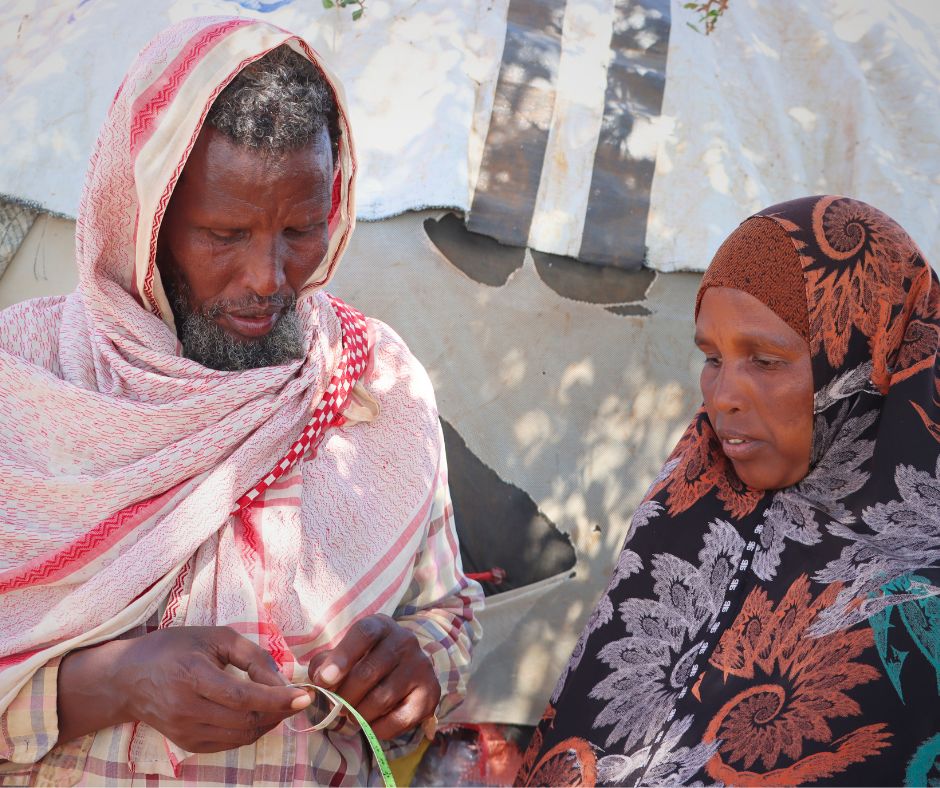Communities living in hard-to-reach areas of Somalia where access to life-saving assistance is limited and vulnerable communities that have been affected by emergencies like the drought struggle the most to find health and nutrition services that are far from them.
With generous support from EU Humanitarian Aid under the Caafimaad Plus consortium, International Medical Corps provides integrated community case management (ICCM) to achieve higher treatment coverage and deliver high-quality care to sick children at the community level in far-flung villages. Part of these services are health education activities that focus on enhancing community awareness of acute watery diarrhea (AWD), cholera, and measles. In these areas, IMC uses community health workers (CHWs), including four mobile health and nutrition teams, to extend emergency life-saving assistance.
Among these community health workers is Noor Said Sahal, 29 years old, who lives in Qoryoweyn village in the Afbarwaaqo district in the Mudug region of Somalia. Noor works in rural villages and supports his community by providing health education and treating minor illnesses through ICCM.
His quick thinking and access to ICCM drugs allowed him to help many. However, he was inspired by an instance when he helped a young boy named Abdirisak, who was suffering from diarrhea and fever. Abdirisak’s mother was extremely worried about her son’s health, but thanks to Noor’s intervention, the boy’s condition improved dramatically. The case of Abdirisak was unique because of his family’s nomadic lifestyle and the long-distance treks they made to seek health services.
Noor’s dedication to his work has not gone unnoticed, as his efforts have led to a significant reduction in the number of illnesses in the community. Many people who were previously hesitant to seek medical treatment are now more willing to do so, thanks to the trust and confidence they have in Noor.
While always carrying medicines in his bag, Noor went door-to-door through the community, assessing and identifying sick people to provide treatment and health education and encourage them to seek medical services when an International Medical Corps mobile team visits their area. Besides his normal community service work, Noor also documented activities, including the number of households visited, the number of patients treated, and any suspected cases of COVID-19 referred to health facilities.
It is this information collected from the communities that is used to monitor and evaluate the effectiveness of the ICCM program and identify areas that need improvement.
During the project period in 2022, International Medical Corps, through ICCM, provided treatment to 723 people in Qoryoweyn village.
Noor expressed his gratitude to the International Medical Corps (IMC) on behalf of his community.
“Thank you very much, International Medical Corps, for the services you are providing in our community, which is in a hard-to-reach area,” he said.
International Medical Corps provides integrated health, nutrition, water, sanitation, and hygiene (WASH) and protection services across five regions of Somalia, including Banadir, Bay, Galgaduud, Middle Shabelle, and Mudug. Since 2013, the mission has supported several health centers in Mudug, including Galkacyo South (GAS) Hospital. In 2021, International Medical Corps increased its services to the Jariiban district of Mudug, 207km from Galkacyo, and in the Galgaduud region in 2022.
Community Health Workers like Noor are deployed to provide timely preventive and curative actions to reduce morbidity and mortality rates related to diarrheal diseases. Treatment is focused on three major causes of child mortality: diarrhea, malaria, and childhood pneumonia. CHWs refer patients needing skilled-care services to local health centers and other fixed facilities. The team also conducts community-based surveillance, where they identify unusual health events, such as rapid increases in cases of a disease or deaths from unknown causes, and report the outbreak and initiate an investigation and response.
Noor’s story is a testament to the important role that healthcare workers play in improving the well-being of their communities. His commitment to providing healthcare services has had a positive impact on the lives of many people and has helped to build a healthier and more resilient community.








